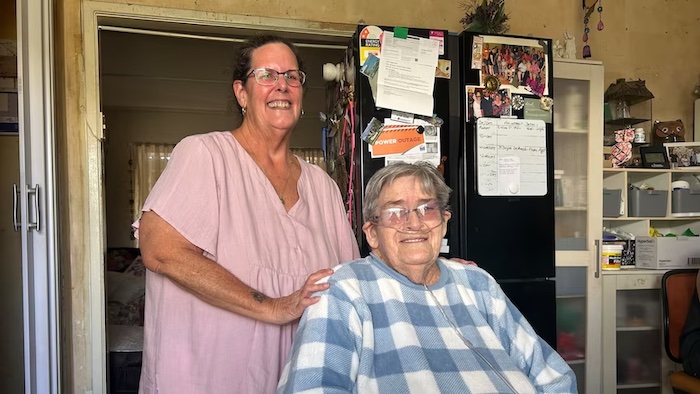— Rhonda Skinner is coming to terms with a hard truth of life — she is dying.

by Julia André
Key points:
- 84-year-old Rhonda Skinner is currently going through end-of-life care with the help of her family
- By 2066, it’s expected that older Australians will account for up to 23 per cent of the population
- A palliative care nurse says talking with loved ones about their end-of-life wishes will become increasingly important
The 84-year-old Mount Isa resident has chronic obstructive pulmonary lung disease and atrial fibrillation, and needs a constant supply of oxygen to breathe.
In November, she was told she would be entering palliative care.
For Rhonda Skinner’s nine children, it was a heartbreaking moment, when they realised the head of their family was at her weakest.
“It’s difficult when they tell you. It’s like, ‘Oh my god, mum’s going to die really soon’,” her daughter, Leigh Skinner, said.
“But it isn’t just about imminent death, it’s a progression.”
Rhonda Skinner has been adamant that she does not want to live out her remaining days in hospital, and her family has worked with the palliative care team to ensure her wishes are guaranteed.
“Without the knowledge that we have now we would have just assumed that once mum got really sick she’d have to stay in hospital,” Leigh Skinner said.
“But the palliative team have set up processes so that when we get to the end, mum will be at home,” she said.
As Australia’s population continues to age, experts are eager to change attitudes about the end-of-life care process and educate families on what caring for a dying relative looks like.
Donna McGregor is the sole palliative care nurse for the North West Hospital and Health Service (NWHHS) in Queensland.
To see her patients, she covers hundreds of kilometres across the outback, tending to residents in small, remote communities and on cattle stations.
“It’s a privilege to work in palliative care, we have quirky personalities, I guess because we’re dealing with death and dying a lot,” Ms McGregor said.
“We’re dealing with people’s [grief] and supporting them at their most pivotal time in life, and also the most distressing time of their life — making decisions that greatly affect them but also their family.”
Tough conversations
In her 30 years of experience working in palliative care, Ms McGregor has seen a shift in how the psychological impacts of death are treated.
“Having conversations is the most important aspect of palliative care — it isn’t just about the person, it’s about the network around the person,” said Ms McGregor.
Australian’s increasing life expectancy and declining birth rates are contributing to the country’s ageing population.
According to the Australian Bureau of Statistics (ABS), the number of older Australians has increased from 1 million (8.3 per cent of the total population) in 1970 to 4.2 million (16 per cent of the total population) in 2020.
By 2066, it’s projected older Australians will make up 21 per cent to 23 per cent of the population.
Ms McGregor believes having hard conversations with loved ones about their end-of-life wishes will become increasingly important.
“It’s absolutely paramount, and good quality palliative care is really good at managing every symptom associated with chronic illness,” she said.
Difference in care
Correna Apiata has experienced the grief and trauma of losing both of her parents.
Ten years ago, she was left scarred by the experience of caring for her father in his final days at home in New Zealand.
“They pretty much just handed us the instruments and left us to our own devices, it wasn’t good,” Ms Apiata said.
When her mother fell sick while living in Mount Isa, the memory of that time came flooding back to her.
However, the experience with her mother was very different.
“Donna [McGregor], she just made everything easier — if there was a moment we couldn’t get to Mum, she’d be like, ‘I’m free I can go,'” Ms Apiata said.
“She made all the hard stuff easy, even the funeral arrangements. We knew that she was just a phone call away.”
New funding will make Ms McGregor’s job easier in the outback, as the NWHHS has received $850,000 from the state government to recruit four new palliative care positions.
“We’ll have a social work department and a full-time Indigenous health worker because as you can imagine demand is going to increase,” she said.
Complete Article ↪HERE↩!
